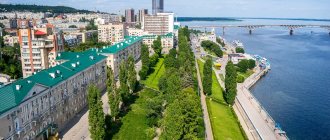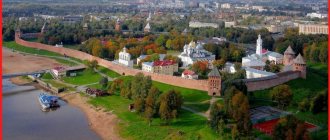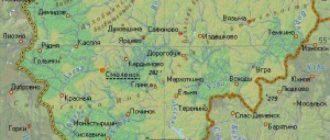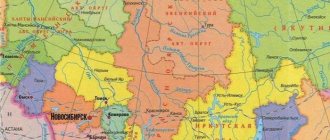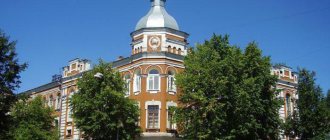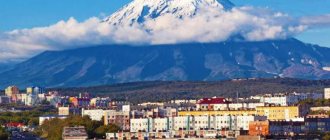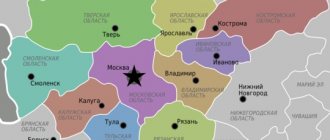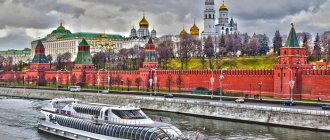Irkutsk region is a subject of the Russian Federation. Located in the southeastern part of the Siberian Federal District.
Date of formation: September 26, 1937.
Area: 776 thousand km2 (15% of the territory of the Siberian Federal District, 4.5% of the territory of Russia).
Population: 2 million 428 thousand inhabitants (according to preliminary results of the 2010 population census).
Population density: 3.3 people/km², proportion of urban population: 78.9%.
Capital: Irkutsk city.
Governor of the region - acting governor Igor Ivanovich Kobzev (since December 12, 2012).
Irkutsk time: +5MSK.
Postal codes of the Irkutsk region: 664xxx - 666xxx
Day of the Irkutsk Region - September 27 (the day of celebration, usually the first or second Sunday of October, is set annually by the organizing committee).
What holiday is it today?
February 10, 2022, Thursday
Today are holidays, events: Diplomat's Day Tomorrow: World Sick Day Discovery of insulin
Today is the Orthodox holiday: St. Ephraim the Syrian. Venerable Ephraim of Novotorzhsky. Venerable Ephraim of Pechersk, Bishop of Pereyaslavl. Venerable Theodosius of Totem, Spasosumorin of the monastery, leader and founder... Tomorrow: Transfer of the relics of the holy martyr Ignatius the God-Bearer. Saints Gerasim, Pitirim, Jonah, bishops of Great Perm, Ustva...
Today is a national holiday: Ephraim's Day... Tomorrow: Lawrence's Day
Seasons
Seasons, four periods of the year (spring, summer, autumn and winter) characterized by certain average temperatures. The period during which the Sun passes through one of these sectors is called the season. Spring in the Northern Hemisphere and autumn in the Southern Hemisphere begin when the Sun passes through the initial circle of declination and its right ascension is 0° (vernal equinox). Summer in the Northern Hemisphere and winter in the Southern Hemisphere occur when the sun's right ascension is 90° (summer solstice). Autumn in the Northern Hemisphere and spring in the Southern Hemisphere begin when the sun's right ascension is 180° (autumnal equinox). The beginning of winter in the Northern Hemisphere and summer in the Southern Hemisphere is considered to be the winter solstice, when the direct ascension of the Sun is 270°... Next: Seasons. Russian folk calendar. Monthly words...
Geographical location of the Irkutsk region
The Irkutsk region is located in the south of Eastern Siberia, almost in the center of the Asian continent, on the main transport routes connecting Europe with the Far Eastern regions of Russia and the countries of the Asia-Pacific region. The southernmost point of the region is located at 51° north latitude. The northern tip of the Irkutsk region almost reaches the 65th parallel. The region borders on all subjects of the Federation that are part of the East Siberian Economic Region: in the west - with the Krasnoyarsk Territory, in the east - with the Chita Region, in the southeast and south - with the Republic of Buryatia, in the southwest - with the Republic of Tyva. In the northeast, the border passes with the Republic of Sakha (Yakutia). The total length of the borders exceeds 7240 km, including along the lake. Baikal – 520 km.
From the east, a significant part of the territory of the Irkutsk region is washed by the waters of Lake Baikal. The Ust-Orda Buryat Autonomous Okrug is located on the territory of the region.
Folk calendar about every day
Every day one season always replaces another and this determines a person’s way of life. In connection with this, a folk calendar was formed in which there were practically no nameless, unmarked days. Every day was special, had its own purpose. All this was determined by climate conditions and astrological phenomena.
A calendar is a system for counting periods of time. The first calendars arose a long time ago, in ancient times, because there was a need to measure time. The word calendar comes from the Latin words caleo - to proclaim and calendarium - debt book. This is due to the fact that in Ancient Rome the beginning of each month was especially proclaimed, and because it was customary to pay debts on the first day of the month. Different peoples counted time differently. Some calendars are based on the changing phases of the moon - lunar calendars; in others - the change of seasons - sunny; in others, the length of the year was coordinated with the change of seasons, and the counting of months was associated with the phases of the Moon. Such calendars are called lunisolar.
In Rus', the calendar was called a monthly calendar. Every day, the month book covered the entire year of peasant life, “describing” day by day, month after month, where each day had its own holidays or weekdays, customs and superstitions, traditions and rituals, natural signs and phenomena. The cyclical nature of the calendar is reminiscent of human life, where spring is youth, summer is heyday, autumn is the time of harvesting fruits (it’s good if there are some, otherwise you can live your life without collecting fruits), winter is the time of wisdom and peace. This cyclicality and rhythm determined the way of life of the farmer. The folk calendar was an agricultural calendar, which was reflected in the names of the months, folk signs, rituals and customs. Even the determination of the timing and duration of the seasons is associated with real climatic conditions. Hence the discrepancy between the names of the months in different areas... Next: Folk calendar...
Magadan region | Area 462 thousand sq. km
The Magadan region ranks fourth among the largest regions of Russia. An entity with a total area of 462 thousand square meters. km occupies 2.7% of the entire state. The founding date of the region is December 3, 1953. 146 thousand 345 people live on the territory of the subject, which is equal in density to 0.32 people/sq. km. The bulk of the population are Russians (72%) and Ukrainians (15%). The Magadan region completely belongs to the regions of the Far North, where permafrost reigns. On its territory there are large deposits of silver, gold, tin and tungsten. At the end of 2015, 979 tons of silver and 22 tons of gold were mined here.
Fishing calendar for every day
The fishing calendar should not be taken as an absolutely indisputable truth. Fish biting is greatly influenced by a whole range of natural factors, as well as the influence on the nature of man himself. You must not forget that the fish’s bite depends and is determined not only by the calendar dates and biological cycles of their life, reflected in the calendar, but also, no less, by the state of their habitat; the bite also depends on weather conditions: air and water temperatures, cloudiness, wind direction and strength, etc... Next: Fishing calendar...
Orthodox calendar about every day
Orthodox calendar: Orthodox, Church and Christian holidays.
The church year is an alternation of weekdays and holidays. On weekdays, a person is called to work “by the sweat of his brow to earn his bread.” Holidays are given in order to feel liberation, to rise above the bustle and routine of the world, to feel involved in the highest of worlds, “where there are no illnesses, sorrows and sighs, but endless life.” Since ancient times, holiday cycles have been associated with the seasons. The pagans associated them with the worship of the forces of nature, the cult of which in the Old Testament was replaced by gratitude to the Creator for the universe. And although the connection between holidays and the seasons has not completely lost its power, since God is present in everything, in the plant and animal world, in human works, it nevertheless faded into the background, giving way to a spiritual foundation built on the Sacred Scriptures. The history of Orthodox holidays dates back to the times of the Old Testament. Each of the Orthodox holidays is dedicated to the remembrance of the most important events in the life of Jesus Christ and the Mother of God, as well as the memory of saints... Next: Orthodox calendar...
Mineral resources of the Irkutsk region
Within the Irkutsk region, four coal-bearing basins are known - Irkutsk, Poymenno-Cheremshansky, Tunguska and Pribaikalsky. Fossil coal resources in the region as of January 1, 2000 are 46 billion tons, of which balance reserves by category. A+B+C1 amount to 8.2 billion tons, reserves cat. C2 - 6.2 billion tons. The main volume of production is produced at three fields in the Irkutsk basin: Cheremkhovskoye, Azeyskoye, Mugunskoye. The general assessment of the predicted recoverable hydrocarbon resources within the Irkutsk region is: for oil - 2050 million tons, for gas - 7.5 trillion m3. The explored reserves of oil and gas within the Siberian platform today allow us to consider Eastern Siberia as one of the promising regions for creating a new center for the production of hydrocarbons. Large fields have been discovered in the Irkutsk region - Kovyktinskoye (gas), Verkhnechonskoye, Yaraktinskoye, Dulisminskoye (oil, gas).
Dozens of deposits and several promising iron ore provinces have been explored (the largest are Angarsk and East Sayan). The total predicted resources of iron ore are 33 billion tons.
About 20 deposits of manganese ores have been explored (concentrated in two main regions - Eastern Sayan and Western Baikal region), the total predicted resources of which are estimated at 470 million tons. Within the Irkutsk region there are three oldest gold mining regions: Leno-Vitimsky, Eastern Sayan and Predbaikalsky . The share of ore gold accounts for approximately 80%, the share of alluvial gold – 15%. Its balance reserves are concentrated in almost 300 fields, and predicted resources have been assessed for more than 100 objects in the Bodaibinsky, Mamsko-Chuysky, Nizhneudinsky, Olkhonsky and Irkutsk administrative regions. In terms of prepared reserves of ore gold, the Irkutsk region ranks 1st in Russia.
The Irkutsk region has significant reserves of rare metals: niobium (65% of all-Russian reserves); tantalum (45%); lithium (50%), rubidium, cesium, beryllium, etc. The predicted resources of rare metals in the Sayan province (11 deposits have been identified and assessed) exceed the resources of all other exploited deposits in Russia. They can more than meet the current and future needs of the domestic industry for rare metals.
The subsoil of the Angara region is rich in deposits of non-metallic raw materials for ferrous metallurgy - magnesite sands (75% of all-Russian reserves), building materials, facing stones.
Among a wide range of non-metallic minerals, deposits of refractory clays, magnesite, molding and glass sands, rock salt, talc, gypsum, facing stones, mica-muscovite, semi-precious and ornamental stones and mineral building materials are in operation.
Russian folk calendar for every day
The word “sign” comes from the word “notice”, i.e. observe. As a result of observing what happens around a person every day, he accumulates life experience. This knowledge was passed down from generation to generation, carefully preserved and people trusted it as a sacred book. Many signs have come to us from the depths of centuries without losing their knowledge. Each of us is free to choose: to dismiss all this as an absurd superstition or to take a closer look at the signs and take the centuries-old experience of generations more seriously. Most of us, when taking exams, ask them to scold them, boasting about some kind of good fortune or luck, spit so as not to jinx them or knock on wood, take a detour if a black cat crossed the road, are afraid of the number 13 and much more. And who among us does not have lucky things, numbers? Who has never resorted to the help of fate at least once in their life, who has not believed in secrets? It’s as if everything connected with signs is hidden somewhere deep in our subconscious. Often we remember them mechanically, unconsciously, or just as a joke. But, undoubtedly, the signs contain a lot of accurate knowledge and practical wisdom of our ancestors. They cover all the characteristic, often difficult to perceive, natural phenomena. Signs have preserved a lot of what was in old folk holidays and customs; they help predict the weather, grow crops... Next: Folk signs...
Holiday calendar, dates and events of the year
All state and professional holidays in Russia, including significant World and International holidays, and other equally interesting holidays and events about every day.
The holiday has always kept pace with the history of mankind. Social time can be divided into three types: everyday life (weekdays), weekends and holidays. Everyday life is a series of practices repeated day after day and every day (work). Weekends are regular breaks from the rush of everyday life. It is believed that on weekends a person should restore his strength after working days. Day off, non-working day. A holiday is a day of celebration established in honor or in memory of someone or something. A day or series of days celebrated by the church in memory of a religious event or saint... Next: Calendar...
Natural conditions (relief features)
The territory of the Irkutsk region covers the south of the Central Siberian Plateau and the basins of the upper reaches of the Angara, Lena and Lower Tunguska. In the southwest, the Eastern Sayan mountain ranges are wedged into it, in the east - the Primorsky and Baikal ranges, the Stanovoe and Patom highlands. The Irkutsk region includes part of the water surface of the lake. Baikal.
The main part of the region has a flat mountainous terrain. There are separate elevations. The lowest point is at the bottom of the lake. Baikal, near Olkhon Island (1181 m below sea level), the highest is at the top of the Kodar Range (2999 m above sea level). Low-lying areas - no more than 1.5% of the territory of the Irkutsk region.
Prayer book, Orthodox prayers for every day
Prayer is the most powerful means for healing all illnesses - both physical and mental. Prayers can be laudatory or grateful, petitionary and repentant. If we have offended God, sinned, we must ask Him for forgiveness, that is, repent. Such prayers are called repentant prayers. If everything is fine with us, if we and our loved ones are healthy and prosperous, if we have a place to live, something to wear, something to eat, we must glorify and thank God for this. Such prayers are called praise or thanksgiving. If some misfortune, illness, trouble or need happens, you need to ask God for help. Such prayers are called petitionary... Next: Orthodox prayers...
Forest resources of the Irkutsk region
The total area of the region's forest fund is 66837.3 thousand hectares (19.3% of the total forest area of the Siberian Federal District). Including the area occupied by coniferous species - 44637.2 thousand hectares (23.8% of the area of coniferous species in the Siberian Federal District). The total reserve of wood of the main forest-forming species is 8768.4 million m3 (28.2% of reserves in the Siberian Federal District).
The forest fund makes up 81% of the territory of the Irkutsk region. The region contains 12% of all Russian mature timber reserves. The structure of the coniferous species composition is dominated by valuable varieties: larch, pine and cedar.
Deciduous forests form only small pockets. Aspen and birch are common in them. There are poplar, alder, willow, rowan, and bird cherry. Recreational resources, tourism
The Irkutsk region has a unique set of recreational resources: tourism, health resorts, and health resorts. In a number of its regions, including on the coast of Baikal, there are favorable microclimatic conditions for aero- and heliotherapy.
In the central ecological zone of Lake Baikal alone, the area of territories suitable for tourism development is 35 thousand km2. The recreational zones of the southern Baikal region make it possible to equip 145 thousand places for short-term recreation, and 50 thousand places for long-term recreation. 2 million people can vacation on the coast of Lake Baikal every year.
On the territory of the region there is the largest in the world Angara-Lena artesian mineral water basin (2.7 thousand km2), about 300 mineral springs, 6 large healing mud lakes. Industrial bottling of mineral waters from 8 sources has been organized. There are over 70 sanatorium-resort, health-improving and other institutions operating in the Irkutsk region.
The famous endemic of Lake Baikal - omul - is the basis for preparing a wide range of delicious delicacies. The furs of Barguzin sable and Baikal seal, used in the manufacture of clothing, have won international diplomas from fur auctions. Baikal's deep drinking water is used in the production of high-quality alcoholic and non-alcoholic drinks that are exported to Australia, the USA and other countries.
Due to its unique properties (of the 2,635 known species and varieties of animals and plants living in the lake, almost 2/3 are endemic, that is, not found anywhere else in the world), Lake Baikal was included in the UNESCO World Heritage List in December 1996.
Zodiac, astrological, eastern calendar. Zodiac signs
In ancient times, to establish the calendar, priests used knowledge of the positions of all the planets. Before the reform of Peter 1, the New Year was celebrated on the Day of the Autumn Equinox. On this day, according to ancient legend, the most peaceful treaty was concluded between the Great Race (ancient Slavs) and the Great Dragon (ancient Chinese) and it was approximately 7518 years ago... For the ancient Slavs, the calendar month corresponded to the lunar cycle from new moon to new moon, taking into account such Thus, the relationship of the entire annual cycle with astronomical and natural phenomena. There was no coherent calendar system. The main natural phenomena are still considered to this day to be the days of the solar equinox and solstice - the Slavic holidays Maslenitsa, Kupala, Ovsen and Kolyada. But during the time of Peter 1, all ancient Slavic calendars were abolished and a new Western European calendar from the Nativity of Christ (Julian calendar) was introduced, while the beginning of the calendar was moved to January 1. The Julian calendar (old style) did not take leap days into account and accumulated one extra day every 128 years. After the October Revolution in 1918, the Gregorian calendar (new style) was introduced in Russia, according to which an amendment of 13 days was introduced. The calendar of the ancient Slavs was based on two planets: the Sun and the Moon. And now they don’t use anything at all. The calendar has become static. There is no such thing as the calendar, it turns out, resting on some planet. Nobody even knows about it. There are just some standard numbers, there are months and holidays. The calendar is based on the Sun and Moon. Why is this so? Because these two luminaries influence the Earth. The Earth revolves around the Sun, and the Moon revolves around the Earth. And these two luminaries create the atmosphere on the planet. From here the calendar is built... Next: Astrological calendar...
Managers
It is necessary to distinguish between the Irkutsk province, the Irkutsk governor-general and the East Siberian governor-general.
List of East Siberian governors-general
| East Siberian General Government (July 22, 1822 – June 16, 1884) | ||
| Dates in position | Full name | Job title |
| July 22, 1822 - January 6, 1833 | Lavinsky, Alexander Stepanovich | governor general |
| January 6, 1833 – September 28, 1834 | Sulima, Nikolai Semenovich | governor general |
| September 28, 1834 - December 6, 1835 | Bronevsky, Semyon Bogdanovich | etc. Governor General |
| December 6, 1835 - July 29, 1837 | Bronevsky, Semyon Bogdanovich | governor general |
| July 30, 1837 - June 29, 1847 | Rupert, Wilhelm Yakovlevich | governor general |
| September 5, 1847 [March 14, 1848] - December 6, 1849 | Muravyov-Amursky, Nikolai Nikolaevich | etc. Governor General |
| December 6, 1849 - February 19, 1861 | Muravyov-Amursky, Nikolai Nikolaevich | governor general |
| February 19, 1861 - April 19, 1864 | Korsakov, Mikhail Semenovich | etc. Governor General |
| April 19, 1864 - January 21, 1871 | Korsakov, Mikhail Semenovich | governor general |
| January 21, 1871 - December 14, 1873 | Sinelnikov, Nikolai Petrovich | governor general |
| December 14, 1873 - August 10, 1879 | Fredericks, Platon Alexandrovich | governor general |
| December 7, 1879 - January 1, 1885 | Anuchin, Dmitry Gavrilovich | governor general |
| January 4, 1885 - December 25, 1886 | Ignatiev, Alexey Pavlovich | etc. Governor General |
| December 25, 1886 - September 1, 1887 | Ignatiev, Alexey Pavlovich | governor general |
| June 16, 1884 | divided into Irkutsk and Amur governorates-general | |
List of governors general of Irkutsk province
| Irkutsk General Government (June 2, 1887 – June 12, 1899) | ||
| In the position | Full name | Job title |
| June 2, 1887 - May 13, 1889 | Ignatiev, Alexey Pavlovich | governor general |
| May 26, 1889 – June 12, 1899 | Goremykin, Alexander Dmitrievich | governor general |
| Irkutsk Military Governor General (June 12, 1899 – March 1917) | ||
| In the position | Full name | Status |
| June 12, 1899 – April 9, 1900 | Goremykin, Alexander Dmitrievich | military governor general |
| April 20, 1900 - May 24, 1903 | Panteleev, Alexander Ilyich | military governor general |
| May 24, 1903 - 1905 | Kutaisov, Pavel Ippolitovich | military governor general |
| 1905 — 1906 | Kaygorodov, Mikhail Nikiforovich | military governor general |
| 1906 — 1906 | Alekseev, Konstantin Mikhailovich | temporary military governor general |
| April 29, 1906 - July 1910 | Selivanov, Andrey Nikolaevich | military governor general |
| July 24, 1910 - February 1916 | Knyazev, Leonid Mikhailovich | military governor general |
| March 15, 1916 - March 1917 | Piltz, Alexander Ivanovich | military governor general |
| March 1917 | General Government abolished | |
List of governors of Irkutsk province
- 1798 - Arshenevsky, Pyotr Yakovlevich
- 1798–1800 — Tolstoy, Alexey Ivanovich
- 1801–1804 — Repyev, Ivan Nikolaevich
- 1804–1805 — Kartvelin, Nikolai Petrovich
- 1805–1806 - Kornilov, Alexey Mikhailovich
- 1806–1819 — Treskin, Nikolai Ivanovich
- 1819–1821 — Zerkaleev, Ivan Semenovich
- 1821–1835 — Zeidler, Ivan Bogdanovich
- 1835–1838 — Evseviev, Alexander Nikolaevich
- 1838–1839 — Levshin, Alexey Iraklievich
- 1839–1848 — Pyatnitsky, Andrey Vasilievich
- 1848–1851 — Zarin, Vladimir Ivanovich
- 1851–1859 — Wenzel, Karl-Bugart Karlovich von
- 1859–1862 — Izvolsky, Pyotr Alexandrovich
- 1862–1864 - Shcherbatsky, Nikolai Fedorovich
- 1864–1880 — Shelashnikov, Konstantin Nikolaevich
- 1880–1882 — Pedashenko, Ivan Konstantinovich
- 1882–1886 — Nosovich, Sergei Ivanovich
- 1886–1889 — Kolenko, Vladimir Zakharovich
- 1889–1897 — Svetlitsky, Konstantin Nikolaevich
- 1897–1908 — Mollerius, Ivan Petrovich
- 1908–1911 — Gran, Pyotr Karlovich
- 1911–1913 — Bantysh, Fedor Alexandrovich
- 1913–1917 — Yugan, Alexander Nikolaevich
List of first secretaries of the Irkutsk Regional Committee of the CPSU
- 1937–1938 — Shcherbakov Alexander Sergeevich
- 1938–1939 — Filippov Arkady Alexandrovich
- 1939–1944 — Kachalin, Kirill Ivanovich
- 1944–1949 — Efimov, Alexander Pavlovich
- 1949–1955 — Khvorostukhin, Alexey Ivanovich
- 1955–1957 — Kobelev Boris Nikolaevich
- 1957–1968 — Shchetinin Semyon Nikolaevich
- 1968–1983 — Bannikov Nikolay Vasilievich
- 1983–1988 — Sitnikov Vasily Ivanovich
- 1988–1990 — Potapov Vladimir Ivanovich
- 1990–1991 — Spirin Viktor Mikhailovich
List of governors of the Irkutsk region
- 1991–1997 — Nozhikov Yuri Abramovich
- 1997–2005 — Govorin Boris Aleksandrovich
- 2005–2008 — Tishanin Alexander Georgievich
- 2008–2009 — Esipovsky Igor Eduardovich
- 2009 - Sokol, Sergey Mikhailovich (acting)
- 2009–2012 — Mezentsev Dmitry Fedorovich
- 2012–2015 — Eroshchenko Sergey Vladimirovich
- 2015–2019 — Levchenko Sergey Georgievich
- 2019 to present - Kobzev Igor Ivanovich (acting).
Dream books online, interpretation of dreams
A dream book is nothing more than an interpreter of dreams and dreams, a translator of dreams. Since ancient times, people have been using dream books; dreams have always been given great importance, and people have often noticed the prophetic properties of some dreams. The dream book can become your faithful assistant every day and throughout your life, thanks to the dream interpreter you can always make the right decisions, the dream book will help you resist temptations in time, and will warn you against wrong steps and frivolous actions. Further…
